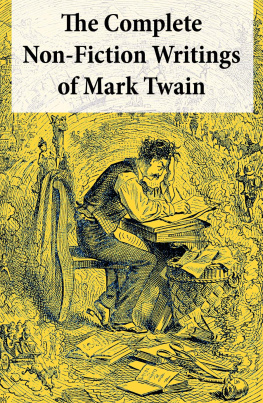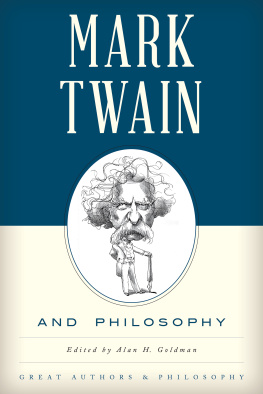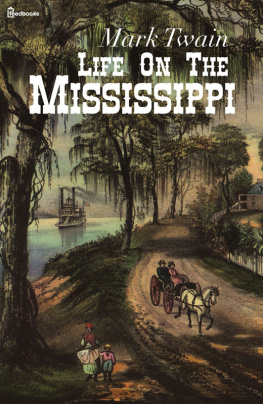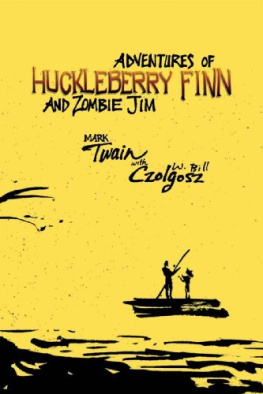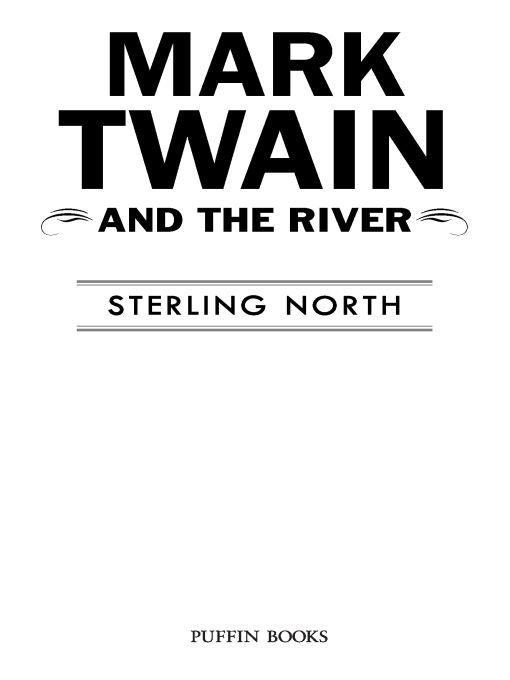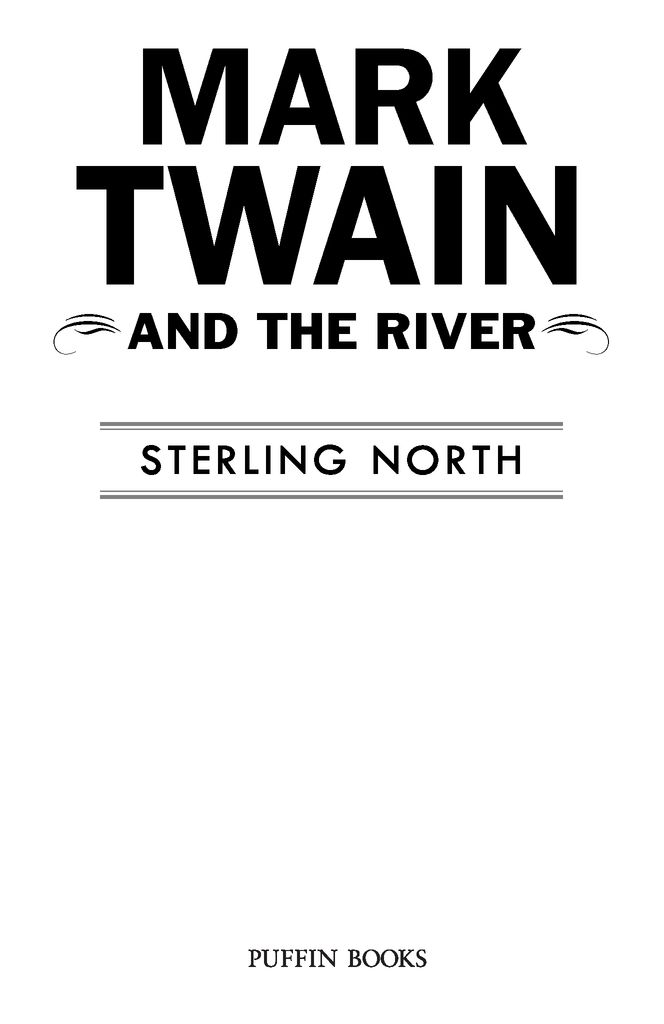Table of Contents
BOYHOOD ON THE RIVER
It would be a mistake to whitewash Sam Clemens gang the way they whitewashed the fence. They were not a band of little angelsin fact few boy gangs are. But they did not fight with knives or guns. They fought mock battles with lath swords, or, in a more serious or desperate mood, fought with their fists. They hooked apples and peaches and watermelons, particularly if this forbidden fruit was carefully guarded by slave patrols and dogs, thus making the raid a real adventure. They used any boat that was handy to cross to the island, or to the pecan groves on the Illinois bottoms, or downriver to the cave. But they returned the boats when they had served their purpose.
They were busy with other small deviltries most of the time. But they had their own code of honor and never snitched on each other, or let a comrade down in any way. And although they may have seemed in league against the adult world, they were pure of heart and dauntlessvery fine pirates and members of Robin Hoods peerless band.
READ THESE OTHER GREAT BOOKS BY STERLING NORTH:
Rascal The Wolfling Young Thomas Edison
For my wife Gladys, companion and collaborator for thirty-four creative years.
And also for my brother John Herschel North and his wife Bess, longtime residents of Mark Twains hometown.
My deepest thanks are due to Harper and Brothers for permission to use quotations from several of Mark Twains books: The Adventures of Tom Sawyer ; The Adventures of Huckleberry Finn; Life on the Mississippi; The Innocents Abroad; Roughing It; and the Autobiography.
Years of reading and thinking have been condensed into this little biography of our greatest and most beloved humorist. More than one hundred books and manuscripts by and about Mark Twain have been consulted. The most useful have been: Mark Twain, the Personal and Literary Life of Samuel Langhorne Clemens (three volumes) by Albert Bigelow Paine; Mark Twains America by Bernard DeVoto; Mark Twain, Son of Missouri by Minnie M. Brashear, and Samuel Clemens of Hannibal by Dixon Wecter.
In addition, many trips have been made to all the Mark Twain shrines, particularly to Hannibal, Missouri, where the cave, the island and the little white house on Hill Street help to re-create the mood in which Twain wrote several American classics.
May I urge every reader to visit the Mark Twain mansion in Hartford, Connecticut; the graves in Elmira, New York, and the octagon summer study on nearby Quarry Farm, but particularly that little city, Hannibal, Missouri, where Mark Twains spirit still broods over the magnificent, the mile-wide Mississippi.
S. N.
A WORD ABOUT NAMES
The subject of this biography, known to the world as Mark Twain, was born Samuel Langhorne Clemens, and throughout his entire life was always called Sam by his best and oldest friends. He adopted the writing name Mark Twain on February 2, 1863, when he was a reporter on the Enterprise in Virginia City, Nevada. Throughout this book the names Samuel Clemens and Mark Twain are used almost interchangeably, and of course always refer to the same person.
A FRONTIER PARADISE (1835-1844)
Uncle John Quarles stepped down from his farm wagon and tied his team to the hitching post in front of the modest frame house on Hill Street. He noticed that the new home had been given a coat of white paint, and that the shutters on the five front windows were a gleaming dark green. Even the fence had a fresh coat of whitewash.
Quarles smiled with pleasure. His brother-in-law Judge Clemens, that proud but unsuccessful tradesman and lawyer, was apparently beginning to pull himself out of debt.
Uncle John wondered which of her children Jane Clemens had dragooned into whitewashing that fence. Certainly not the oldest son, Orion, who at eighteen spent most of his time in St. Louis learning the printing trade. Pamela at sixteen was a gentle young lady with musical inclinationsand no young lady in Hannibal, Missouri, in the year 1844 would be asked to sully her hands with a job like whitewashing a fence. Henry at six was a very good boy, but too young for such a task. So it must have been that rascal Sam, whose eight and a half years had been crammed with more mischief than useful labor. Uncle John liked Sammy the best of all, with his ruck of russet curls and his merry blue-green eyes, the delight and despair of his sprightly mother, Jane.
John Quarles had come to Hannibal on the previous afternoon. Not wishing to crowd the little Clemens home, he had spent the night at a neighboring hotel. Now that he had made his purchases, he was ready to pick up Jane and Sam for their summer-long holiday at the big Quarles farm near Florida, Missouri. Aunt Patsy Quarles was Janes sister, and throughout the summer they buzzed away at each other, happy as bees in clover.
For a moment Uncle John paused to view the little white town of Hannibal, bathed in the misty sunlight of this June morning. The village lay cupped in a valley between bluffs to the north and the south. All its attention was centered on the mighty Mississippi, which carried, on its flowing tide, rafts of white pine lumber, handsome side-wheel steamers, painted and gilded; and in flood times masses of floating driftwood and even cabins washed from their foundations. This brown and swirling highway to distant New Orleans captured the imagination of any man who looked upon ita dangerous river, a beautiful river draining most of the American continent. John Quarles did not wonder that his nephew, little Sammy Clemens, and all the other barefooted boys of Hannibal, were constantly risking their lives in or on its waters.
It would be a long, dusty drive, that thirty-five winding miles to the farm, and this day looked as though it might be another sizzler; so Uncle John turned his gaze from the river to the front door of the house, open for summer coolness, and garlanded on the step with several drowsing cats.
Jane! he boomed heartily. Sam!... Where is everybody? Time to get going!
Sam Clemens, sitting comfortably between his mother and his uncle John on the wide seat of the farm wagon, watched the team of dapple-grays flicking flies with their tails as they ambled easily along the road. He didnt know whether to be happy as a meadow lark or sad as a whippoorwill as the wheels rumbled along the rutted trail leading westward from Hannibal.
It was one of those almost impossible choices which a boy must always be making, such as whether to play Robin Hood or whether to play Pirate; whether to let your warts grow, or whether to risk your life trying to cure them with spunk-water to be found in old hollow stumps in the middle of haunted woods at midnight during the dark of the moon.
Every summer he had to make the same difficult decision about his vacation: whether to stay in Hannibal with Pamela and Henry, and his father the Judgeor go with his mother to the Quarles farm. It was always hard to say good-bye to his best friends, Will Bowen, John Briggs, and that happy-go-lucky vagabond, Tom Blankenship, who never had to go to school, and who spent a perfectly heavenly life sleeping in barrels, smoking a corncob pipe, and doing anything else he pleased. But the farm was a gay and joyous place too.




